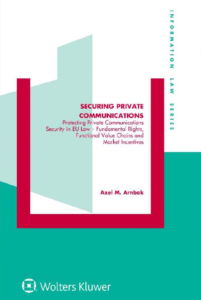After the publication of my Ph.D. thesis in November 2015, at long last my book ‘Securing Private Communications’ is available in stores near you.
You can order the book here, have a look at the marketing flyer here, download the full academic version for free here and read the odd spiffy testimonial below.
Props to my publisher, Kluwer International: I’m the first author to publish a work under a Creative Commons license. In a few months, the full book will be available on my website, in the spirit of open access.
The book tackles the research question how the EU lawmaker should protect communications security, and as such deals with the regulation of ‘cyber security’ and broader questions of information governance too – such as privacy and communications freedom. The book is based on my Ph.D. thesis and could come in handy for scholars, practicioners and policymakers working on privacy, security and broader areas relating to the governance of information. There’s an abstract here.
For Dutchies, here’s a 25 minute conversation I had on BNR national radio about the book:
I’d like to thank the following folks for blobbing the book:
Private communications are all around us, the internet is in our ‘things’. While our bits flow across the world, often our data lacks robust protection. Axel Arnbak has managed to grab a critical and complex regulatory phenomenon and offer both conceptual and practical advice on what to do about it. Warmly recommended.
– Jacob Kohnstamm, Chair Dutch Data Protection Authority, former Chair Article 29 Working Party.
We learned from DigiNotar that online trust is broken, and from Ed Snowden that it’s even more broken. So what should European institutions be doing about it? You should read Axel Arnbak’s book to find out.
– Ross Anderson, Professor of Security Engineering, Computer Laboratory at Cambridge University, author of a.o. ‘Security Engineering’.
As an EU lawmaker I belong to the target audience of Axel Arnbak’s book. In my every day work I am painfully aware of the shortcomings of the legislative process described by him, and the potentially devastating consequences for citizens. Most legislators of today, and indeed judges, were born decades before the arrival of the internet and mostly fail to fully grasp the subject matter. Arnbak provides an essential, and indeed alarming overview of communications security in all its aspects, and the inadequate policy response. A must read for lawmakers.
– Sophie in ‘t Veld, Member of European Parliament, Vice-President ALDE Group.
This book is highly recommended reading to everyone who seeks to understand the past and present of communications security law and policy from a comparative perspective and wants to learn more about the specific ways in which these frameworks can be improved in an increasingly vulnerable and globalized digital world.
– Urs Gasser, Professor or Practice, Harvard Law School; Executive Director, Berkman Center for Internet & Society, Harvard University.
Axel Arnbak is the first to comprehensively map the EU regulatory framework for communications security. This book comes exactly at the right time and is highly useful for practitioners around the world.
– Richard van Staden ten Brink, lawyer and partner at De Brauw Blackstone Westbroek.
Computer security is about more than technology. It’s about economics, psychology, a policy, and more. Arnbak adopts a fascinating interdisciplinary approach to EU communications security policy — something that is badly needed in this debate.
– Bruce Schneier, CTO Resilient Systems, author of a.o. Applied Cryptography and Data and Goliath, Board Member Electronic Frontier Foundation.
A unique conceptualization and critical review of European policy making. Axel Arnbak uses a strong empirical angle to support his ideas on communications security and matches it with a consistent normative framework.
– Nico van Eijk, Professor of Media and Telecommunications Law and Director of the Institute for Information Law, University of Amsterdam.

Congratulations on the publication of your book! The topic of securing private communications is more relevant than ever, and your work makes a valuable contribution to the ongoing discussion. Looking forward to diving into it!